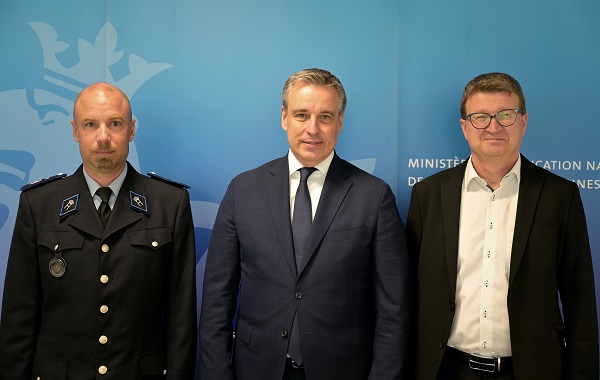 (L-R) Tim Pauly, representative of the national crime prevention service; Claude Meisch, Luxembourg Minister of Education, Children and Youth; David Lentz, deputy state prosecutor;
Credit: MENEJ
(L-R) Tim Pauly, representative of the national crime prevention service; Claude Meisch, Luxembourg Minister of Education, Children and Youth; David Lentz, deputy state prosecutor;
Credit: MENEJ
On Wednesday 5 July 2023, Claude Meisch, Luxembourg Minister of Education, Children and Youth, David Lentz, deputy state prosecutor, and Tim Pauly, representative of the national crime prevention service, presented the "Not sharing is caring" campaign at a press conference.
The “Not sharing is caring” campaign aims to unite the efforts of the three partners but also to make young people think and take responsibility for recording and sharing videos online that show acts of violence or harassment.
“Preparing young people for the evolution of society and in particular for digitalisation also means making them aware of how to act and react correctly when they witness a real or recorded act of violence. We want to make young people aware of the repercussions of publishing or broadcasting violent videos. If we succeed in preventing the sharing of such videos on social networks, we also curb the incitement to produce them and the acts of violence themselves”, highlighted Minister Meisch.
Today, video recordings of acts of violence between young people are unfortunately not isolated cases; they have taken on the stature of a sad normality. The objective of the “Not sharing is caring” campaign is to inform teenagers of the consequences of inconsiderate sharing of such videos between friends or on social networks. Many young people are unaware that the dissemination of such videos not only aggravates the situation of the victims, but is also a crime punishable by law.
The campaign also aims to encourage young people who witness acts of violence not to look away, but to act. Instead of remaining passive observers of violence, the campaign will encourage young people to react, without, however, putting themselves in danger. According to the ministry, by calling the police, each young person can help a victim of violence.
Videos published on the social networks of the Ministry of Education, Children and Youth and the National Youth Service (SNJ) aim to convey the message “Not sharing is caring”. The website www.notsharing.lu provides information for young people on the consequences and sanctions for the perpetrators of violence as well as for those who film or share videos of violent acts. Victims receive information on the measures to take and the people to contact in the event of violence. Stickers with the slogan will also be distributed to young people.
Making violent videos between young people is a societal phenomenon that goes beyond the framework of the school, but the ministry considers it necessary to strengthen and unite the efforts of all the partners to maintain a protective school environment.
In October 2022, the Ministry of Education, Children and Youth published a ministerial instruction aimed at guiding schools in the event of acts of violence observed on school grounds or at school. The proposed measures were drawn up in close collaboration with the public prosecutor's office and the Grand Ducal police to clearly identify the structures, procedures and interlocutors concerned. This aimed to facilitate the signalling and the close and continuous exchange around juvenile delinquency.
In secondary schools, the Psychosocial and School Support Services (SePAS) and the socio-educational services work to raise awareness and prevent acts of violence and harassment. The forthcoming introduction of a student protection delegate (DPE) within each school aims to further reinforce their efforts. The DPE’s main mission will be to supervise young people in the event of violence or harassment. The Student Protection Officer will be the neutral contact person that students and teachers can contact for help and support, and to report bullying.
Raising awareness requires permanent efforts and the involvement of all the players in the education system, the ministry stated. Other initiatives in this context include the BEE Secure awareness campaigns of the initiative on the risks of violence and harassment on the Internet, the thematisation of violence within the framework of the "digital sciences" course in secondary school, and the campaign Exit-Mobbing of the psychosocial and scholastic assistance centre (CePas), the S-Team “Setz dech an” (get involved) initiative which encourages young people to commit to non-violent coexistence, etc.








